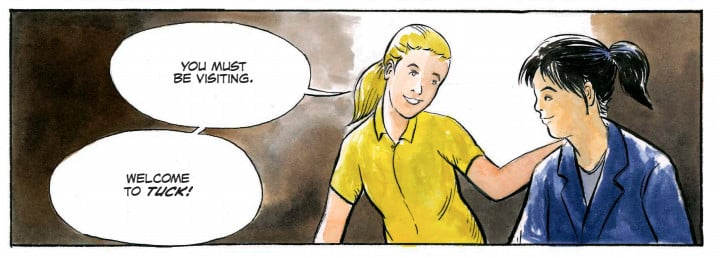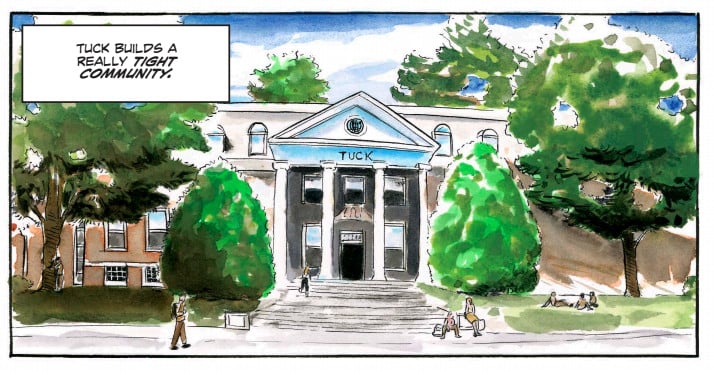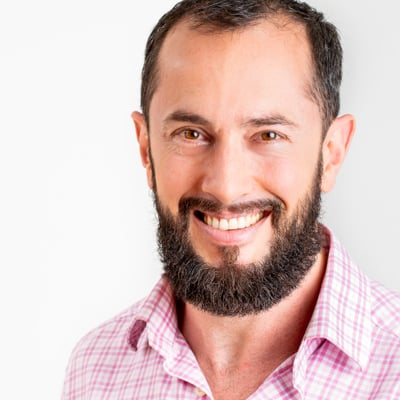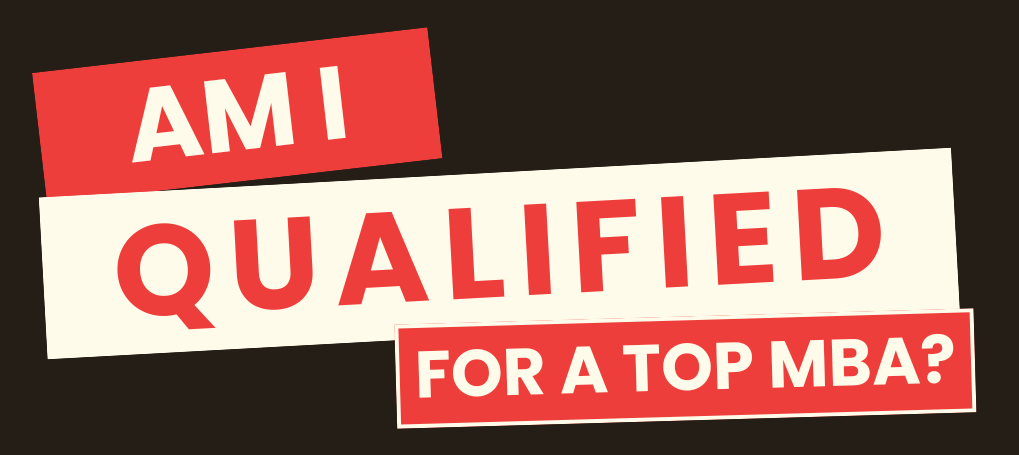In this interview with Luke Anthony Peña, Tuck’s Executive Director of Admissions and Financial Aid, we talk about the Tuck MBA and what it’s like to be a student at Dartmouth’s business school. (See another interview with Luke on Tuck MBA Admissions Criteria)
Our discussion about the Tuck MBA experience includes:
- How Tuck’s community is unique
- A story demonstrating how far Tuck students will go to support each other
- The relationships that students are able to build with their professors
- Electives and opportunities for independent study
- Recruiting opportunities from Tuck (in the Northeast and beyond)
- How alumni and the Career Development Office support you with recruiting
To read more about the topics we discussed in this interview:
Or, start your application now: Apply to Tuck
The Tuck MBA Community
David: I’m here today with Luke Anthony Peña, Executive Director of Admissions and Financial Aid at Tuck. And Tuck is a business school that we really like. I visited Tuck myself last year, had a great time both in the class visit and meeting the students, and wanted to start asking about the community at Tuck.
When I visited, I came up the steps, went to the left to the admissions office, got my student host. And one of the first things that I noticed is that we’re trying to walk to class, and everyone knows my student host. We had a hard time to kind of get to class between all of the people who wanted to say hello or had something that they wanted to say to him.
I feel like the community at Tuck is very different, even though a lot of MBA programs talk about a close community. How can people understand the community at Tuck?
Luke: Thanks, David. Thanks for having me and thanks for recognizing what I think is something that’s really special about Tuck, and that’s the Tuck community, as you mentioned, and the close-knit bonds that the Tuck students and the alumni and the faculty and the staff have with each other. I love the fact that we’ve got a very distinctive and special community. I encourage all of our applicants and candidates who are making a decision about schools pay really close attention to the community. To steal a term from finance, that’s the asset that appreciates in value over time.
You think about coming out of a school and being 5, 10, 20, 50 years out of the school, that community is something where you’re going to continually come back to and draw from and lean on and rely on. And so it’s a really important factor for any school. So for the Tuck community, we think of three factors that make the community especially distinctive:
One of them is the focus. So the MBA program is the heart of what we do at Tuck. It’s the only degree we grant. There’s no Ph.D., no executive MBA, no part-time program, no undergraduate program. And that means the community and the resources therein are dedicated and focused primarily to the MBA students. And so this means that you have repeated interactions with the faculty, with the career team, with the staff, with the TuckGO team, and with each other. And you develop a familiarity with one another that helps heighten and strengthen the bonds therein.
The second factor is the scale. I think it’s no secret that Dartmouth College Tuck is one of the most distinctly scaled business schools in the MBA landscape. We have approximately 285 students each year, and that is a size that allows you to get to know each one of your classmates. You get to know each other very well, and you very quickly move past the pleasantries that are necessary when you first meet people. You know, where are you from, and what did you do, and that kind of thing. But you quickly move past that, and you start to build real genuine relationships with the others who are alongside you. And that depth of relationship means that you’re going to develop friendships, you’re going to develop close relationships, and you’re going to develop a sense of care and empathy for the people around you. You see that on display here.
And then the third, of course, is the location in Hanover, New Hampshire. So the location is very distinct at Tuck, and thank you for making the journey to Tuck in Hanover.
David: I think it’s fair to say that almost no one is living in Hanover NH before they attend. Right?
Luke: That’s very true. Yes, and not many people doing work here before coming to Tuck, and very few people living here, yes. So the location is something that’s very special. And actually, the point you just made is a fairly fundamental one because unlike studying in a large community in which some non-trivial portion of the class may already have lived there or may already have deep existing networks there, everybody who comes here to Hanover is coming here from somewhere else. And so that means that your focus and your attention is on one another rather than on some pre-existing community. So each of the students are dedicating their time and their effort to building those new relationships and cultivating those new relationships.
And then of course, in a place like this, your academic experience is not the only opportunity for deep engagement. You are spending your social life and your recruitment efforts with the people around you. And that repeated depth of interaction creates this sense of depth, this sense of closeness, and this sense of camaraderie which I think helps students really elevate their sense of judgment and about the risks that they take. So you see the interplay in the combination between those three really contribute to a community that I think is unlike any other you’ll find in the full-time MBA landscape.
David: I think so too. And I mean, these are all kinds of rational, logical factors that explain it, kind of the focus, the size, and the location.
Dartmouth Tuck’s “Nice” Students
David: Now, I’ll tell you I was on the road to nine different programs last year, and almost every kind of admissions office tried to tell me some variation on the story that went like this: “Our community is so tight, you wouldn’t believe it. Two Tuck students were recruiting for the same job, but they practiced interviews with each other because that’s how much they supported each other.”
And I heard this old chestnut pretty much everywhere. But what’s kind of one or two distinctive experiences or things that people do at Tuck beyond these kind of logical arguments about the kind of size and scale? How can people really feel it for themselves? Or, what’s an example kind of showing how well the students know each other and how much they get along with each other?
Luke: Sure. Yeah. It’s a great point, and you’re right that I think that collaboration and camaraderie is something that a lot of schools are emphasizing, and Tuck is no different. But we don’t have the market cornered exclusively on something like that.
David: You’re being too modest. I think that Tuck really does have a different community, but just it’s hard for people when there’s so many marketing messages about the same thing. So many business schools are saying the same thing, but then I’m sure you have examples of how the students interact with each other that would really show a little bit of why it’s different at Tuck.
Luke: Yeah, I do. And I think a lot of it has to do with the sense that — and this comes back to some of the discussion that we’ve had about our criteria and what we look for in the application. But the fact that there is a sense of genuine niceness and a sense of kindness and care in the community that is remarkable and striking, and I’ve been very impressed and blown away with this myself as somebody who is now in my second year as part of this community.
So you see, for example, I think it was two or three weeks ago, I was hearing the story from a student here. He was on the way to Boston to travel, and he was on international travel. And he left his passport here in Hanover. He was getting ready for an international trip, he didn’t have a fairly important document to be able to do that travel. And so texted a friend in the class here, and the classmate put out a few more calls, a few more texts.
And in the course of the next 10 to 15 minutes, had found another classmate that was on the way to Manchester, which is about halfway between Hanover NH and Boston. And then found another classmate who happened to be in Manchester who was headed down to Boston. So they facilitated this exchange where one student took it to Manchester, and then a second student picked it up from Manchester and drove it down to Boston. And by the time that first student was arriving at Logan Airport in Boston, the passport was waiting for him.
And so you just see these kind of examples where students are fundamentally oriented and have this disposition to going out of their way to take care and to help others in the community. And you see examples like this over and over and over and over again.
David: That is true love. I mean, I’m thinking that my parents were here visiting me from my kind of international journey last week. And at the end of the trip, they had an early flight to catch. I gave them a hug and a kiss, and I put them in the taxi. But you know, driving the passport out to Boston, that’s a nice one.
Luke: Yeah. We go the extra mile in that sense. Right?
And so you see, one, we strive very hard, even in the admissions and the selection process, to identify people who have this habit of kindness and this behavior and these patterns of really caring for one another and believing that we succeed by investing not just in ourselves, but also in other people. But then I also believe that when students come here, again, the location and the size play into this because, to put it another way, there’s nowhere to hide. If you’re not an engaged, collaborative, friendly member of the community, it’s very hard to succeed because you can’t just show up and do your thing in class, and then disappear.
You are seeing these same members of the community socially, professionally, extracurricularly, and so there is what I would call this positive social pressure that you are upholding your end of relationships.
David: It’s funny that you say it, because I visited a school in a large urban area before I came to Tuck School of Business on my trip, and then I was in– you know, all the schools I’m visiting, of course top business schools. They’ve screened out highly intelligent, highly motivated candidates, and went into this class. And the professor cold called someone at this other urban school.
“Oh, I didn’t read the case. I’m so sorry. This was my first week in the class.” OK, fine.
The professor made fun of him a little bit. Calls the next person. The next person hadn’t read the case either. She tried to bluff her way through it, but you could tell. And I felt like part of the reason that– how does it make any sense that these smart, motivated people who are spending $200,000 and two years of their life haven’t even read the damn case before they step in the classroom? They kind of figured, well, “I’m not going to see any of you again.” You know? “What’s it to me if you think that I’m a little bit lazy?”
And then at Tuck, I saw on my visit, people were doing role playing on this case, “Is Mr. Bacon fried?” And some people had to put the name tags and get in front on the stage in front of everyone, and everyone kind of knew exactly what the case was about.
Luke: Yeah. There’s an accountability in that, an accountability to know that you will be letting your classmates down. It’s not just about yourself, but also letting your classmates down if you don’t come to your study group prepared, if you don’t properly prepare with the study group and then be prepared to contribute in the class.
Teamwork at the Tuck School of Business
Luke: You know, Tuck is a place where you do actually very little, in terms of the MBA program, by yourself.
You have a study group, and that starts the day that you start your very first classes in the first year, first week. You have these TuckGO trips where you are– whether it’s the global insight expedition, or whether it’s the OnSite global consulting, whether it’s a global FYP or first-year project– you’re doing it with other people. You’re not going by yourself.
David: I mean, you guys even started before the term. You have preterm trips that you use as a form of getting people to bond with each other before they step on campus. Right?
Luke: That’s right, yes. And so that is meant to facilitate these connections, but you cannot be transactional in these connections and get away with it. It is very much because of the size and location that if you were to try to come and not engage and not contribute and participate in the community in a very collaborative engaged kind of way, I think it would be very obvious within the community, and it would be a difficult place to succeed if that was the experience you were trying to have. And so those structural features help sustain and foster this culture where people really are looking out for each other and building the strength in community.
The Tuck MBA Student–Professor Relationship
David: Tell me a little bit more about the relationship that the Tuck students have with the professors.
Luke: Yeah. So our faculty are both scholars and researchers. Excuse me, scholars and educators. Scholars meaning that they are conducting research. And I think it’s one of the myths about the Tuck School that the professors are dedicated to teaching at the expense of research. That is fundamentally not true. 96% of our faculty here are tenure track faculty. And every single one of the tenure track faculty or tenured faculty is both researching and teaching in the classroom. And I love this model. I think that there are communities out there where the research faculty and the teaching faculty are bifurcated. And you may have a core group of researchers on the left and a core group of teachers on the right, and maybe they come together to co-teach a class, but there is not integration in these great skills.
You think about somebody like Paul Argenti, who is a scholar in corporate communications and corporate social responsibility. And our students, they see him in the news talking about how Facebook needs to be navigating their latest round of discussions on Capitol Hill, or what Tesla needs to do about how Elon Musk is treating people at the company.
And then, they’re sitting in the class, and then they’re engaging with him outside of the class on these very topics, you know, somebody like Syd Finkelstein who is a scholar in good management and authors these bestselling books like, “Superbosses,” about grooming talent and why smart executives fail, about the pitfalls to avoid. And then he’s in the classroom teaching analysis for general managers. And he is engaging with students and bringing his insights to bear there. Or Emily Blanchard, her research is on trade policy, and what’s a more relevant topic right now?
Tuck’s MBA Curriculum: Electives & Independent Study
David: What if someone wants to study, during their Tuck MBA, a relatively kind of esoteric topic? Because it may be that with a smaller number of professors, you don’t always have a specialist in each area. What kind of options do you have for people who want to study something that might not be a part of the curriculum right now at Tuck School of Business?
Luke: Sure. Well, I think about our opportunities for independent study, and I think about taking advantage of the broader Dartmouth community as well. One of the beautiful things, of course, about Tuck and Hanover, is that we are integrated within the larger Dartmouth community. That’s true from a literal sense: We all share the same campus, so we’re not set off aside in some other part of town. But we are here. We are literally connected to the engineering school, as in you can walk between the engineering school without ever stepping outside.
And so you see a lot of our students engaging with some of the energy that’s happening there around energy, around entrepreneurship, around growing technology. And so you have those kinds of opportunities, you have engagements with the medical school, and with the undergraduate side.
And so this is an area where you do take advantage of a broader Ivy League institution that houses our great business school. So there are these opportunities to be able to be going beyond and more broadly. I don’t see many students coming to Tuck and saying, “well I didn’t have the opportunity to explore the topic that I wanted.” I think this has a lot to do with the general management curriculum. Students are aware and appreciate that you come to Tuck to get a strong foundation in economics and statistics and accounting, marketing, finance, all of these core topics.
Coursework to Build the Foundation for Your Career
Luke: And then these are things that you apply to your areas of expertise in your internship. Yes, they’re some of the second year electives, and then in the career afterwards. But this gives you flexibility and nimbleness to where you don’t have to be a narrow student focusing just on one thing that may limit your options going forward. It actually gives you the flexibility to be a leader and to pivot and to move across different careers as life may take you going forward. And so my sense is that the students who come here appreciate the general management nature of the Tuck curriculum. And yes, they do have specific interests, but they’re not trying to go deep in the way that, say, a Ph.D. student does into one topic without connection and crossover into all of the other elements of leadership.
And so it’s a great question, and yet it’s something that through the Dartmouth College connections, through the faculty, through the independent studies that we have, and this orientation towards general management, the students have found their way through building the curriculum that helps them drive towards their goals.
Recruiting & Careers at Tuck
David: And with this kind of talk of their goals and the way that the Tuck MBA curriculum prepares people for a broad set of different kind of career outcomes, just tell me a little bit about the recruiting at Tuck and the kind of opportunities that the graduates have for internships and full-time placements.
Luke: Sure, yeah. Another one of the myths that I love to dispel about Dartmouth College and Tuck is that being in Hanover is a disadvantage to recruiting because you’re not in the big city. And to that, I say you just need to look at statistics of our place match.
You know, two years ago for the class of 2016, 98% of the class was sitting on an offer three months after graduation. That was the best of all of our peer schools. And then for the class of 2017, it was 96%. So you’re seeing that you can come to Hanover, you can have this immersive experience with a distinct class size, and still have wild success in recruiting.
David: One thing that I think people don’t always know is that a lot of the companies will come to Hanover NH to recruit. And then if it’s a four hour trip from New York, they’re not going to turn around and drive back the same day. You guys will have them there at– what’s the name of the hotel right across the street from campus where they house them all? The Hanover Inn, right across the street. The Hanover Inn, that you’re going to have dinner with them as well after the info session because they aren’t going to make it back anyway that night.
Luke: Yeah. You’re fundamentally speaking to the truth that relationships are what helps you in the job search. So resumes are documents that just get the conversation started and may catch the eyes of recruiters, and yet you don’t get the job and you don’t succeed in the job without good relationships. Part of that is relationships with recruiters, just as you mentioned. So you were absolutely right that when recruiters do come to campus– and our career team works very hard to bring recruiters who do campus-based recruiting to Tuck School of Business.
When they come here, one, you have fewer students sitting on your left and on your right at these discussions because of the class size, and so that gives you more opportunity to develop a sense of relationship and engagement with the recruiter. And then yes, unlike a large city where a recruiter might just pop into campus for an hour or two hours and then return to their office or move on to the next business school, the recruiters are here for the day, for the night, and they are hosting office hours, evening chats, dinners, and this is an opportunity to increase the sense of conversation. You have more conversation with the recruiter, you create a deeper connection, and you’re more memorable, and you stand out in the mind of that recruiter when it comes time for them to make decisions.
Tuck’s Career Development Office & Alumni Network
David: Besides the kind of on-campus stuff, what do you do for people who want to recruit somewhere else? So whether it’s tech tracks for the West Coast, or whether it’s international students who may want to return to an international market for their job, what does Tuck do to facilitate that?
Luke: Yeah. It starts with the career team. The career team is fundamentally committed to making sure that they are working one by one by one with the students. One of the amazing things that the career team is now doing, the career team is, of course, making themselves available to students on the way in and they are meeting with students as early as possible to get a sense of what are your goals, how can we help, how can we support you?
Everybody does that, but here’s the really amazing thing: The career team, after getting a sense of what your goals and your ambitions are, if you don’t come see them, they proactively will check in with you, which is amazing and very distinctive in the market. They will say, oh, you know. They’ll check in with you at a certain time after you show up on campus and they’ll say “hey, we know you were interested and this particular industry and just wanted you to know we’re recruiting for this industry. You haven’t come by and seen us yet. How can we help? What can we do?”
So this is a career team that is so committed to each individual relationship that they’re actually initiating the contact with you and going out and saying, “hey, we’ve been tracking. We’ve noticed that you haven’t had a conversation about this yet with us. What is it that we can do to be helpful and supportive?” And that is just a great example of the level of individualized and customized attention that is paid to each student and their goals.
So the career team’s organized around industry verticals, and so you have a coach who has deep knowledge and relationships within whatever it is you’re recruiting for, whether it be something like finance or consulting or health care or energy or international recruiting. And so all of that is available, and then, of course, you leverage the students, the faculty, the alumni.
Making New Connections Through the Dartmouth Tuck Community
Luke: You asked about relationships with faculty earlier. Many times, Tuck students are opening doors on the career side based on the relationships that they’ve built with faculty. And faculty are making introductions and connecting people within their networks based on those interactions. Students are doing the same. Alumni are doing the same. And I think alumni, this sense of wanting to pay it forward, wanting to contribute that we’ve already discussed really manifests itself here.
I was talking with a student, I think about three or four weeks ago, who said that he was trying to transition into a new industry. It was health care. And he said that he found an alum who had a very senior position in one of the organizations that he was considering. Hadn’t interacted with her before, but he reached out and contacted her, and really just wanted advice and maybe an introduction. This was on a Sunday. She ended up spending three to four hours on that Sunday mock interviewing, giving him tips. They did a mock interview once. She said, “OK, these are the things that you need to work on, and take an hour or two to practice these and then call me again.” Got back on the phone two hours later, gave another mock interview, said “you’ve improved in these things. You still have to work on this.” They ended up doing three mock interviews over the course of four hours. They’d never met before. And he ended up getting hired at one of their major competitors as a result of this great investment of time and resources.
These are the kind of examples that highlight the support you need, especially if you are thinking about looking at careers outside of what might be a traditional campus-based search. You need people that are going to go out of their way to connect you, to support you, and to prepare you. And our alumni are fantastic, and I think, really the cream of the crop at that.
David: I mean, every job that I have ever gotten has been through some kind of a relationship. Not especially alumni, you know, I am not an MBA graduate myself. But the final corporate job I had was someone who had been my client before. Then the one before that was a former supervisor who I had done great work for. And the one before that was maybe a little bit more of a kind of chain of one thing leads to another: It was my wife’s boss, his sister was an executive recruiter, and had a line on the opportunity there.
But every job has always been searching through the people who I knew and not beating down the front door with job applications and just an applicant tracking system that goes nowhere, and you never hear back from them.
Luke: Yeah. It’s emblematic of the Tuck philosophy, which is that you always have more success if you go at it with others than by yourself, and the recruiting process is no different. Yes, you can try to be navigating the process all by yourself and landing great opportunities there, you’re just not going to have as much success as you would if you were leveraging the career team, if you were leveraging the alumni, if you were leveraging your students and your faculty.
And it is those relationships, just as you said, that will open the doors. They will open more doors, they will open doors faster, and it’s fundamentally aligned with how we think about Tuck being a relationship-driven place.




